MelpApp: A Game-Changer for Team Communication and Collaboration
In today’s fast-paced business world, effective communication and collaboration are essential for success

In today’s fast-paced business world, effective communication and collaboration are essential for success

Let me ask you something. Are you a business owner? Are you a team lead? Are you a member of a team? If you are any of these, let me directly put it

To add featured content go to Theme Options -> Homepage (Featured) and turn the switch on then add the content you want for each section.
Top video conferencing software with AI-powered features for enhanced productivity are melp app, Google Meet, Zoom, and Microsoft Teams. Among these four, melp app works on a unique approach reflected in its name, Multi-Enterprise Linking Platform. It supports both internal and external collaboration across departments, vendors, clients, and partners. Businesses can conduct secure video conferencing
Secure collaboration is no longer an IT preference. It is a board-level priority that directly impacts enterprise risk, financial exposure, and brand reputation. As organizations rely on enterprise messaging platforms to share contracts, financial data, employee records, and intellectual property, compliance standards have become part of vendor evaluation. Among these standards, SOC 2 stands out
The best scalable solutions for global collaboration are melp app, Google Workspace, and Microsoft Teams. These platforms support distributed teams, enable real-time communication, and provide structured digital work environments that scale across regions, departments, and partner organizations. Among the three, melp app offers a structurally different multi-enterprise architecture. Unlike traditional collaboration tools that focus mainly
Transparency has become a defining factor in how modern organizations build trust, manage risk, and scale operations. Teams no longer work in isolation. They collaborate across departments, locations, and even across companies. Decisions are made in shared workspaces, files are edited simultaneously, and conversations happen across multiple digital channels. In this environment, visibility into who
Introduction Most collaboration platforms claim to offer encrypted messaging, yet the depth and structure of that encryption can vary significantly from one vendor to another. While marketing pages often highlight security badges and technical terminology, decision-makers in the evaluation stage need far more than surface-level assurances. When teams are narrowing down vendors, comparing encrypted messaging
Introduction Every message sent inside a workplace carries weight. It might include a product roadmap, a client contract, financial data, or a simple conversation that guides a key decision. As businesses rely more on digital tools, those messages move through collaboration platforms rather than conference rooms. That shift has made encrypted messaging more than a
Modern businesses rely heavily on real-time calling inside collaboration platforms. Whether it is a leadership sync, a client pitch, or an operational escalation, voice and video calls are central to daily execution. When network conditions are stable, communication feels seamless. When connectivity drops, productivity suffers instantly. For founders and IT leaders, the real issue is
Modern workplaces run on collaboration platforms. Teams message in real time, share files instantly, host video meetings, manage tasks, and integrate dozens of third-party tools into a single digital workspace. These applications have become the backbone of remote work, hybrid teams, global outsourcing, and enterprise coordination. When a collaboration platform fails, productivity stops. When it
In fast-paced healthcare environments, quick messaging feels convenient. A nurse needs clarification on a dosage. A physician wants to share a lab result. A care coordinator needs to confirm discharge instructions. Consumer messaging apps like WhatsApp seem like an easy solution. But convenience does not equal compliance. When patient safety, privacy laws, and legal exposure
For years, Europe was seen as a careful, sometimes slow adopter of workplace technology. Strong labor protections, strict data rules, and deeply rooted organizational cultures often meant digital change happened step by step. That perception no longer holds. The Europe digital workplace market is not just growing, it is accelerating in ways that even seasoned